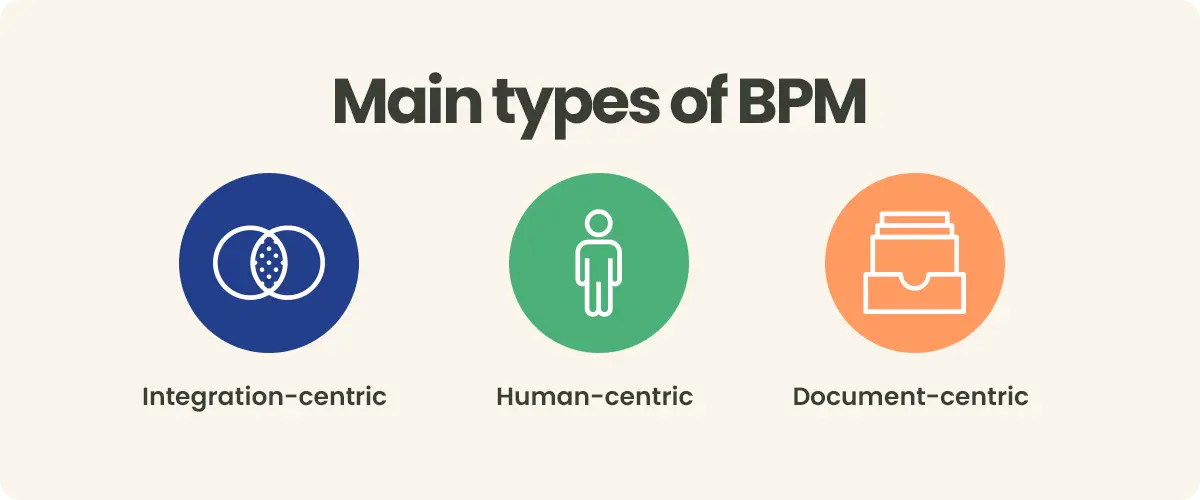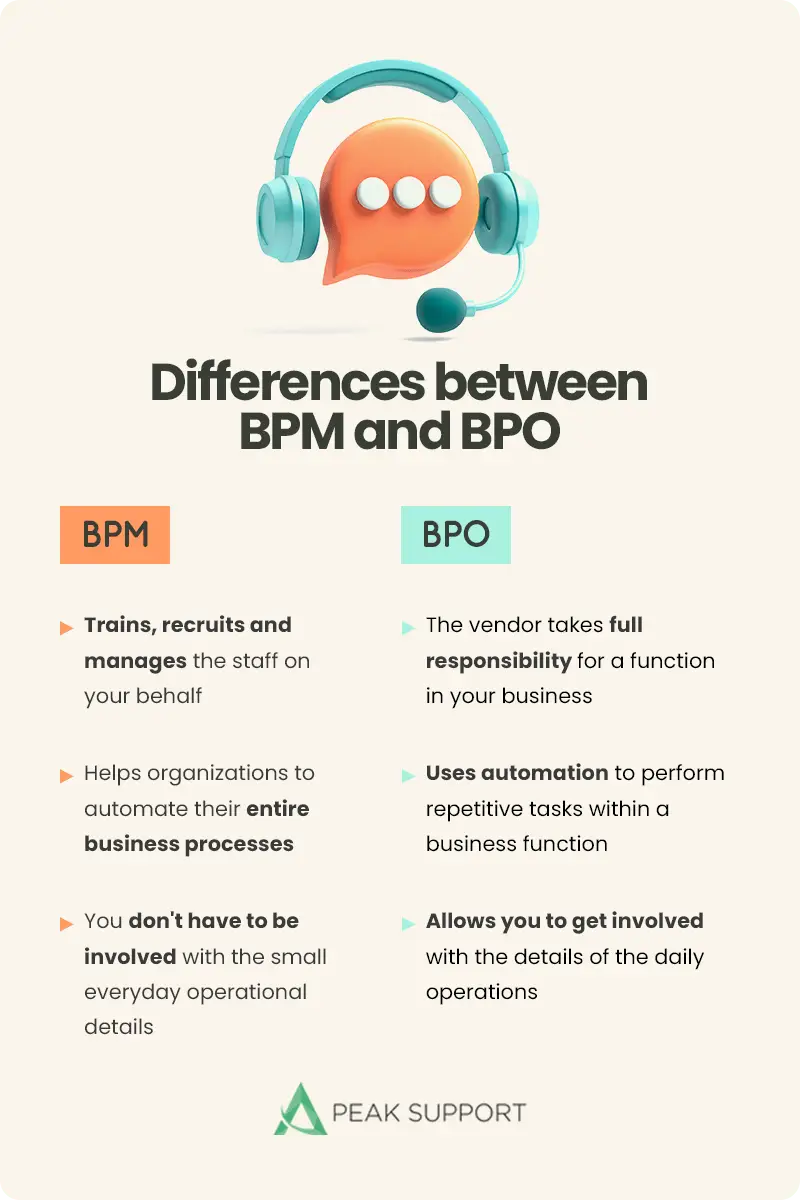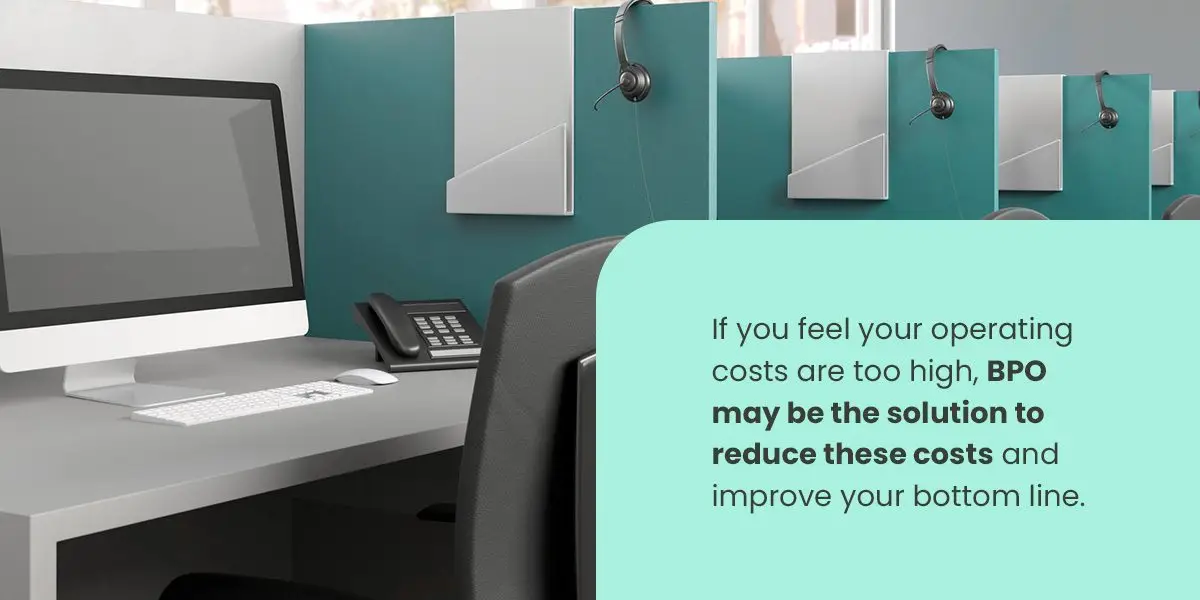What are BPO and BPM?
Business process management (BPM) focuses on improving steps repeated in an organization’s processes. Business process outsourcing (BPO) is the act of outsourcing functions in a business to a third-party vendor. Both models help companies to improve and optimize business functions and processes. Knowing how they differ and when you should implement them is essential.
Let’s take a closer look at these models so you can make the most of each in your business.
What is BPO?
Business process outsourcing is outsourcing an entire business function to a third party. This outsourcing is different from outsourcing a single task. For example, companies outsource their full marketing function instead of a single marketing project. Business process outsourcing can include outsourcing two types of functions — back-office and front-office:
- Back-office functions: These operations are non-customer-facing. They can be functions such as accounting, human resources and payroll.
- Front-office functions: These functions are customer-facing. They include areas such as sales, marketing and customer service.
You can choose from three arrangements when you outsource functions in your business.
- Offshore: You can outsource your functions to an overseas company further away from your home country. For example, a U.S.-based company may hire a BPO vendor in India.
- Nearshore: You may hire a BPO company near your home country. For example, a company in the U.S. may work with a provider in Canada.
- Onshore: This is when you work with a BPO company within your home country.
The first step to business process outsourcing is pinpointing which functions will benefit from this service. Then you can research BPO companies that specialize in this area. It’s essential to do your research and find companies with a track record in your industry and specific function. Vendors with relevant experience will have the expertise and technology to optimize your operation.
Once you have found your desired company, they will assess your needs. Business processing vendors tailor their service to suit your unique business needs. Once you have decided on which provider to go with, the company will create a contract called a master service agreement or a service level agreement detailing the terms of your contract. Once you begin working with the BPO company, they will draw up a statement of work (SOW) agreement to cover the finer details of carrying out each project.
What is BPM?
BPM is a technique used to observe repeatable processes within a business. Instead of focusing on one project, it looks at the entire end-to-end process. BPM aims to discover, model, analyze, improve and optimize your business strategy ad processes. People often need clarification on the difference between BPM and project management. Project management focuses on single, once-off projects. You can use BPM outsourcing to streamline your workflow, leading to cost savings and improved efficiency.
It’s essential to understand the BPM lifecycle to see these improvements in your business:
- Design the process: Start by identifying the milestones in your business process. Then identify each task within the BPM process along with the task owners. Clearly define these tasks so that your team can spot areas of improvement and define the metrics to track them.
- Create a model: Translate the process into a visual model. Include specific details about how long the processes should take, description of tasks and workflow data. Business process management software can help you to create this visualization.
- Execute the plan: Test the BPM system on a small group in your company. Once you have received feedback, you can make the necessary changes and roll it out across your organization.
- Monitor the progress: Track and measure the efficiency of your improvements. Monitor the system to see if other areas need further improvement.
- Optimize the procedure: Make final improvements to the system to enhance business processes.

There are three main types of BPM that your company can use:
- Intergration-centric: These processes need no human involvement. Instead, they rely on application programming interfaces (APIs) to integrate data across all business systems.
- Human-centric: This BPM relies on human involvement. The interfaces are intuitive and allow users to assign tasks to different roles to maintain accountability.
- Document-centric: This type of BPM centers around a document, such as a contract. When companies buy a product or service, they must go through several rounds of approval to reach an agreement between the client and vendor.
What are the differences between BPM and BPO?
There are key differences between business process management and business process outsourcing. For your organization to make the most out of each model, you need to know how each model works.
1. Team management styles
In BPO, the vendor takes full responsibility for a function in your business. You are still involved in managing and motivating staff in this function with the support of the BPO provider. The vendor will help you with will hiring, replacing and training employees. On the other hand, a BPM provider trains, recruits and manages the staff on your behalf. When there is a change on their team, you won’t experience any disruption in your workflow.
2. Degree of automation
BPO uses automation to perform repetitive tasks within a business function. This automation reduces human errors and improves the efficiency of the operation. BPM helps organizations to automate their entire business processes. Automating tedious tasks increases employee motivation and reduces burnout. It allows your business to run more efficiently and frees your teams to focus on more productive tasks.
3. Process efficiency
Even though you outsource a function, BPO allows you to get involved with the details of the daily operations. BPM takes this responsibility entirely off of your hands. All you have to do is work with the BPM provider to define the standard of operations for processes to run efficiently, improve productivity and reduce turn-around-time. With clearly defined criteria, you don’t have to be involved with the small everyday operational details.

When to use BPO
Companies are often drawn to BPO because it offers them greater flexibility. When you outsource non-core functions and administrative tasks such as payroll, it allows you to channel those resources into other core areas of your business, like product development. Focusing on your core competencies can give you a more significant advantage over your competitors. The following are a few more examples of why organizations use BPO:
- Access innovative technology: BPO also gives you access to technologies you need. BPO vendors constantly strive to improve their services by investing in innovative technological solutions and practices. Working with a BPO company gives you access to those solutions without investing much money into new infrastructure.
- Free up resources to scale: If you need to scale your business, outsourcing functions to a BPO company allows you to reassign resources when you need to and improve productivity swiftly.
- Support customer service: Many businesses use a BPO call center to generate sales quickly. A BPO call center handles all incoming and outgoing customer calls using sales technology that enables them to do so efficiently. In many cases, a call center will specialize in a specific industry. For example, the third party may focus solely on taking tech support calls.
- Cut back on costs: If you need to reduce your operational costs, BPO can help you do so. Performing the job in-house may cost you more than outsourcing to a third-party vendor. If you need more resources to run the function than you have available in-house, BPO is also a wise choice.
- Reduce monotonous tasks: If you spend too much time on non-core functions, consider outsourcing them. Doing so will free you to focus on core competencies and other critical business aspects.
- Enter foreign markets: BPO also helps with scaling your business. Suppose you are interested in expanding by opening an overseas branch. In that case, it may be beneficial to work with a BPO company that has experience in the country’s industry and knows the culture and language.
When to use BPM
BPM focuses on improving the structure around business processes and removing any inefficiencies. There are several examples of how an organization can use BPM:
- Distribute content: BPM can help organizations automate content creation and distribution. You can design the system to interact with content management, rights management, content traffic and work order.
- Improve customer service: To alleviate your customer service team, you can use chatbots to help answer frequently asked customer questions. Chatbots can further help automate this process by creating personalized messages for customers. A BPM call center can bridge the gaps between systems and tasks to provide consistent, responsive customer service.
- Automate finance: BPM helps create templates to standardize purchase orders in your finance function. This automation speeds up your procurement process.
- Support human resources: Your HR department can streamline documentation and workflow using BPM. It is especially beneficial for onboarding and offboarding employees, performance evaluations, time off requests and timesheet approvals.
- Fulfill orders: To provide your customers with excellent customer service, BPM can help you improve order fulfillment efficiency. You can use it to capture and fulfill your customer orders.
When you choose to use business process management to improve your process inefficiencies, you can also reap the following benefits:
- Better efficiency: BPM helps you to optimize your existing process and create a structure that supports new methods. BPM does this by removing monotonies and blockages that limit productivity and efficiency. You can achieve your business outcomes quickly and reallocate any excess resources to other business areas.
- Enhanced employee productivity: BPm helps eliminate repetitive work. It makes it easier for employees to access the information they need. By removing monotonous tasks, BPm allows employees to focus on work that adds value to business operations.
- Improved customer experience: When your staff can focus on your business’s most essential functions, it helps improve your customer experience. Enhanced processes translate to better customer service and improved product and service delivery.
- Better transparency: BPM clearly defines which employees own what tasks in your business process. This definition allows for greater clarity and accountability. Employees also know who to communicate with regarding specific tasks.
- Easier to scale processes: Using BPM enables you to automate your workflow and better execute your strategies. Making it easier to scale your business.
What is right for your business?

If you need help deciding if BPM or BPO is right for your business, some signs can help you decide. Let’s first look at some problems that may indicate that you need BPO services:
- Lack of customer service: Your customers are the bread and butter of your business. Incompetent customer service can result in you losing customers to your competitors. It’s important that you respond quickly and find a BPO company that can improve your customer experience.
- Need to reduce operating costs: If you feel your operating costs are too high, BPO may be the solution to reduce these costs and improve your bottom line.
- Tedious tasks are draining resources: You can outsource time-consuming tasks to an expert BPO company. They will be able to perform it professionally and more efficiently than your staff.
- Lack of specific competencies: Sometimes, it’s best to hire a BPO provider to carry out a function than to hire or train employees to complete it. The company will improve the quality and efficiency of the work. Your staff may also not have the capacity to meet specific functions, which indicates that you may need to outsource.
- Want to focus on core business: Many businesses outsource because it makes strategic sense. They can concentrate on enhancing their core business instead of perfecting supporting functions.
When considering if you should use business process management, these signs can help you to make your decision:
- Inefficiencies in processes: Process inefficiencies are often the first sign that you need BPM. You can tell whether you have inefficiencies by analyzing how long it takes projects to move through processes. You can also look at your key performance indicators (KPIs). Most operations will have KPIs attached to them, telling you whether they are performing as they should.
- Unmet business objectives: If you are struggling to meet your business objectives, business process management can help you understand where you need to improve. Using BPM, you can align your business strategy, performance and teams to clearly define and meet your objectives.
- Operating in a saturated market: When a market becomes saturated, you usually have two choices. Either expand to a new market or introduce a new product or service, which can take time. While you find innovative solutions, BPM can help you to optimize processes that improve your margins.
- Expanding business: When you grow your business outside your head office, your processes must be robust and make sense to new employees. You can use BPM to understand what works and what methods will scale well.
Improve your business with Peak Support business process outsourcing

When your business is growing fast, you need to free up your time and resources to focus on the core aspects. Business process outsourcing provides you with the professional support needed to scale your business. When you partner with us, you can have peace of mind that your customer service, technical support and back office are in good hands. We take these functions off of your plate and make them better. As a reputable third-party vendor, our output is unparalleled compared to in-house business capabilities.
If you would like a quote or to learn more about our services, contact us for more information today!

